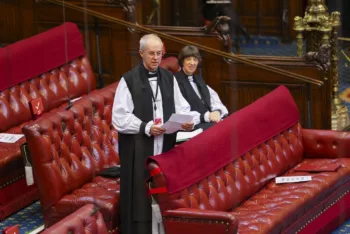
The Commission on Political Power has published a proposal on how the House of Lords could be reformed. The Commission’s paper recognises that the automatic right of bishops to sit in the House of Lords is ‘anomalous’, and suggests that future appointments need to take into account ‘the balance of faith representation’. Humanists UK has long campaigned for the removal of the automatic rights of bishops to sit in the House of Lords. It welcomes the Commission’s proposal for reform, but says that this recommendation does not go far enough.
At present, the House of Lords does not reflect the diverse make-up of the UK. The 2019 British Social Attitudes Survey shows that the share of British adults belonging to no religion now stands at 53%, with 12% Anglicans, 7% Catholics, 18% other Christians, and 9% all other religions. Further, the 26 bishops of the Church of England enjoy privileges over and above other peers including special consultation privileges prior to legislation being brought before Parliament, privileged speaking rights in the chamber and exemptions from the Code of Conduct. Further, sittings in the House of Lords open with Anglican prayers every day. This practice disadvantages those who do not wish to take part by potentially limiting their ability to find a seat and participate in subsequent debates.
Humanists UK submitted a contribution to the Commission last year, endorsing recommendations in the report of the All-Party Parliamentary Humanist Group, Time for Reflection. This called for the repeal of laws granting bishops with automatic right to sit in the House of Lords; to avoid any custom or practice of awarding peerages to individuals by virtue of being representatives of any religion or denomination and appoint religious leaders only on merit in the same way as for everyone else; replacing daily prayers with an inclusive time for reflection; or – if the last recommendation is not possible – for prayers to be held elsewhere on the Parliamentary estate and not in the Chamber where debates are held.
The Commission noted Humanists UK’s concerns, including how proposals to expand the number of religious representatives are unworkable. However these points are absent from the Commission’s final report.
Humanists UK Director of Public Affairs and Policy Richy Thompson commented:
‘We are pleased the Commission agrees that the status quo is untenable, and considers the presence of bishops in the House of Lords as a point of concern. However, we think that the only possible solution is to remove entirely the automatic right of the bishops to sit in the Lords.
‘The current situation is unfair, unjustified, and unpopular. It privileges the interests of one denomination of one religion over all others, at odds with the aspiration of a more representative and democratic Government. There is no sound justification for giving bishops special privileges and arguments claiming unique moral insight are outright insulting. Further, the British Public are strongly in favour of the bishops’ removal.
‘We encourage the public to write to their MP to support a forthcoming debate on the removal of the automatic right of Church of England bishops to sit in the House of Lords, so there can be a more accurate reflection of the UK’s pluralistic society.’
Notes:
For further comment or information, media should contact Humanists UK Director of Public Affairs and Policy Richy Thompson at press@humanists.uk or phone 020 7324 3072 or 020 3675 0959.
Write to your MP about removing bishops from the House of Lords.
Read the Commission on Political Power’s Option Paper.
Read the All-Party Parliamentary Humanist Group’s report, Time for Reflection.
Read more about our work on bishops in the House of Lords.
Humanists UK is the national charity working on behalf of non-religious people. Powered by 100,000 members and supporters, we advance free thinking and promote humanism to create a tolerant society where rational thinking and kindness prevail. We provide ceremonies, pastoral care, education, and support services benefitting over a million people every year and our campaigns advance humanist thinking on ethical issues, human rights, and equal treatment for all.
